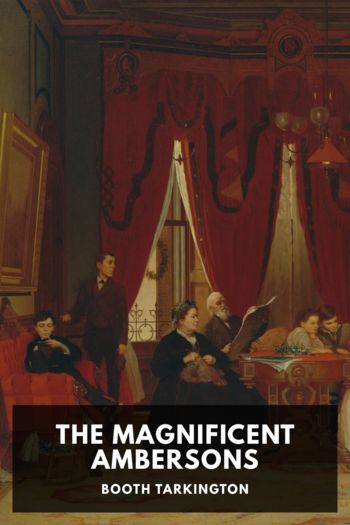Alice Adams by Booth Tarkington (ebook reader macos TXT) 📕

- Author: Booth Tarkington
Book online «Alice Adams by Booth Tarkington (ebook reader macos TXT) 📕». Author Booth Tarkington
Alice stopped, then laughed ruefully, exclaiming, “But this is dreadful of me!”
“Is it?”
“Blackguarding her to you when she’s giving a big party for you! Just the way Henrietta would blackguard me to you—heaven knows what she wouldn’t say if she talked about me to you! It would be fair, of course, but—well, I’d rather she didn’t!” And with that, Alice let her pretty hand, in its white glove, rest upon his arm for a moment; and he looked down at it, not unmoved to see it there. “I want to be unfair about just this,” she said, letting a troubled laughter tremble through her appealing voice as she spoke. “I won’t take advantage of her with anybody, except just—you! I’d a little rather you didn’t hear anybody blackguard me, and, if you don’t mind—could you promise not to give Henrietta the chance?”
It was charmingly done, with a humorous, faint pathos altogether genuine; and Russell found himself suddenly wanting to shout at her, “Oh, you dear!” Nothing else seemed adequate; but he controlled the impulse in favour of something more conservative.
“Imagine anyone speaking unkindly of you—not praising you!”
“Who has praised me to you?” she asked, quickly.
“I haven’t talked about you with anyone; but if I did, I know they’d—”
“No, no!” she cried, and went on, again accompanying her words with little tremulous runs of laughter. “You don’t understand this town yet. You’ll be surprised when you do; we’re different. We talk about one another fearfully! Haven’t I just proved it, the way I’ve been going for Henrietta? Of course I didn’t say anything really very terrible about her, but that’s only because I don’t follow that practice the way most of the others do. They don’t stop with the worst of the truth they can find: they make up things—yes, they really do! And, oh, I’d rather they didn’t make up things about me—to you!”
“What difference would it make if they did?” he inquired, cheerfully. “I’d know they weren’t true.”
“Even if you did know that, they’d make a difference,” she said. “Oh, yes, they would! It’s too bad, but we don’t like anything quite so well that’s had specks on it, even if we’ve wiped the specks off;—it’s just that much spoiled, and some things are all spoiled the instant they’re the least bit spoiled. What a man thinks about a girl, for instance. Do you want to have what you think about me spoiled, Mr. Russell?”
“Oh, but that’s already far beyond reach,” he said, lightly.
“But it can’t be!” she protested.
“Why not?”
“Because it never can be. Men don’t change their minds about one another often: they make it quite an event when they do, and talk about it as if something important had happened. But a girl only has to go downtown with a shoestring unfastened, and every man who sees her will change his mind about her. Don’t you know that’s true?”
“Not of myself, I think.”
“There!” she cried. “That’s precisely what every man in the world would say!”
“So you wouldn’t trust me?”
“Well—I’ll be awfully worried if you give ’em a chance to tell you that I’m too lazy to tie my shoestrings!”
He laughed delightedly. “Is that what they do say?” he asked.
“Just about! Whatever they hope will get results.” She shook her head wisely. “Oh, yes; we do that here!”
“But I don’t mind loose shoestrings,” he said. “Not if they’re yours.”
“They’ll find out what you do mind.”
“But suppose,” he said, looking at her whimsically; “suppose I wouldn’t mind anything—so long as it’s yours?”
She courtesied. “Oh, pretty enough! But a girl who’s talked about has a weakness that’s often a fatal one.”
“What is it?”
“It’s this: when she’s talked about she isn’t there. That’s how they kill her.”
“I’m afraid I don’t follow you.”
“Don’t you see? If Henrietta—or Mildred—or any of ’em—or some of their mothers—oh, we all do it! Well, if any of ’em told you I didn’t tie my shoestrings, and if I were there, so that you could see me, you’d know it wasn’t true. Even if I were sitting so that you couldn’t see my feet, and couldn’t tell whether the strings were tied or not just then, still you could look at me, and see that I wasn’t the sort of girl to neglect my shoestrings. But that isn’t the way it happens: they’ll get at you when I’m nowhere around and can’t remind you of the sort of girl I really am.”
“But you don’t do that,” he complained. “You don’t remind me you don’t even tell me—the sort of girl you really are! I’d like to know.”
“Let’s be serious then,” she said, and looked serious enough herself. “Would you honestly like to know?”
“Yes.”
“Well, then, you must be careful.”
“ ‘Careful’?” The word amused him.
“I mean careful not to get me mixed up,” she said. “Careful not to mix up the girl you might hear somebody talking about with the me I honestly try to make you see. If you do get those two mixed up—well, the whole show’ll be spoiled!”
“What makes you think so?”
“Because it’s—” She checked herself, having begun to speak too impulsively; and she was disturbed, realizing in what tricky stuff she dealt. What had been on her lips to say was, “Because it’s happened before!” She changed to, “Because it’s so easy to spoil anything—easiest of all to spoil anything that’s pleasant.”
“That might depend.”
“No; it’s so. And if you care at all about—about knowing a girl who’d like someone to know her—”
“Just ‘someone’? That’s disappointing.”
“Well—you,” she said.
“Tell me how ‘careful’ you want me to be, then!”
“Well, don’t you think it would be nice if you didn’t give anybody the chance to talk about me the way—the way I’ve just been talking about Henrietta Lamb?”
With that they laughed together, and he said, “You may be cutting me off from a great deal of information, you know.”
“Yes,” Alice admitted. “Somebody might begin to praise me





Comments (0)